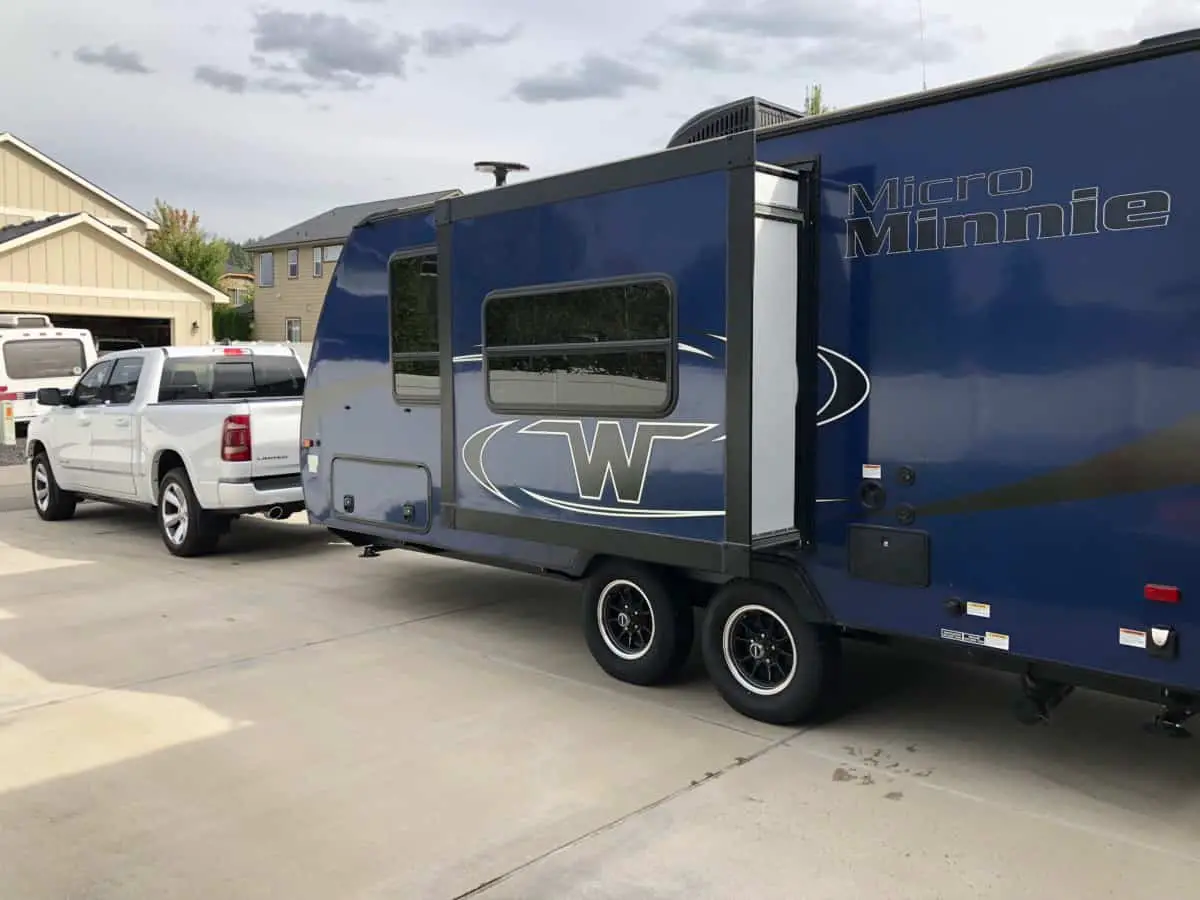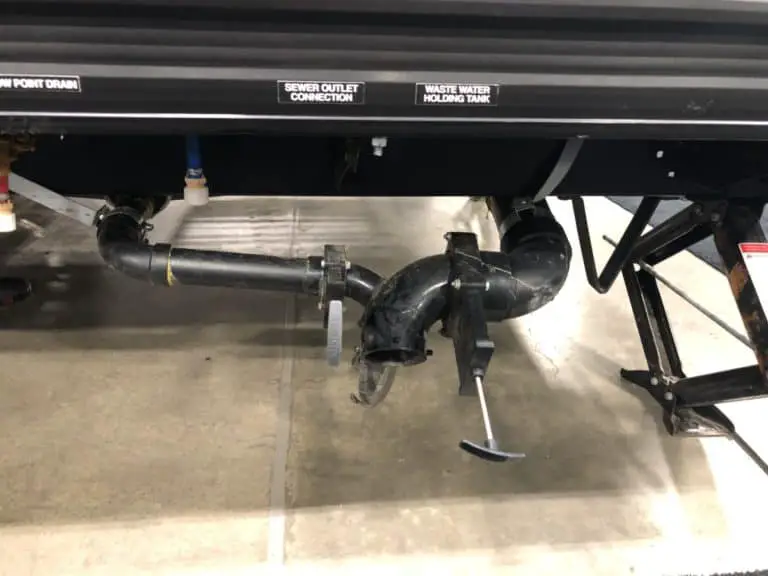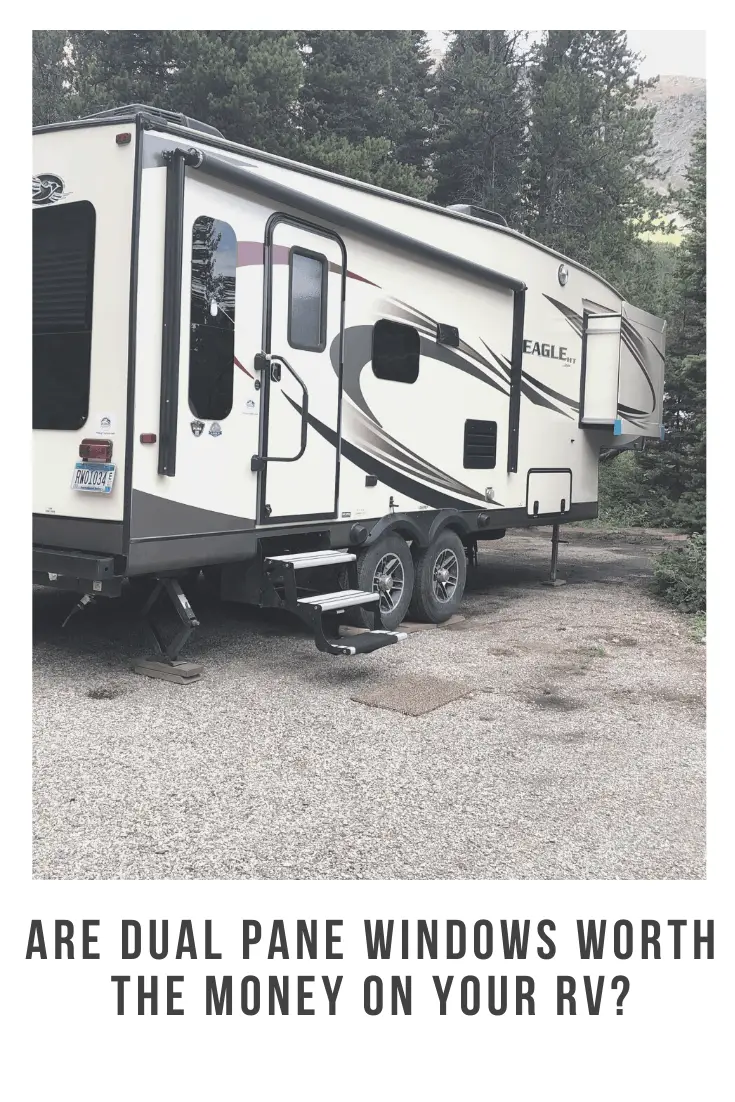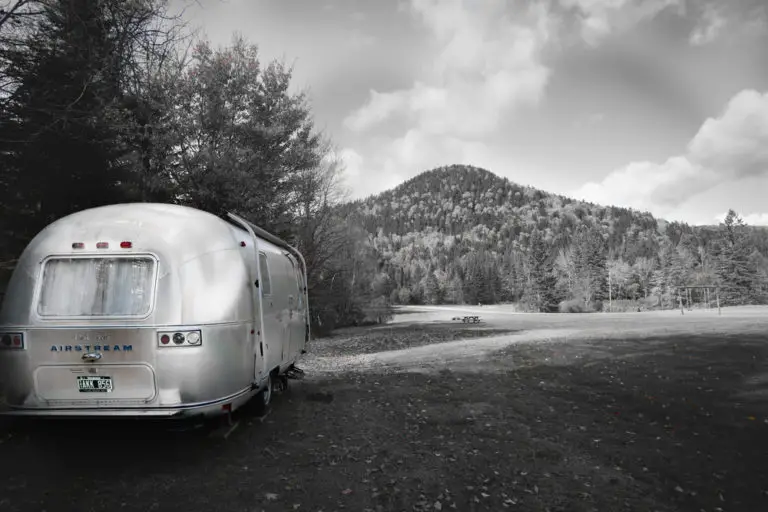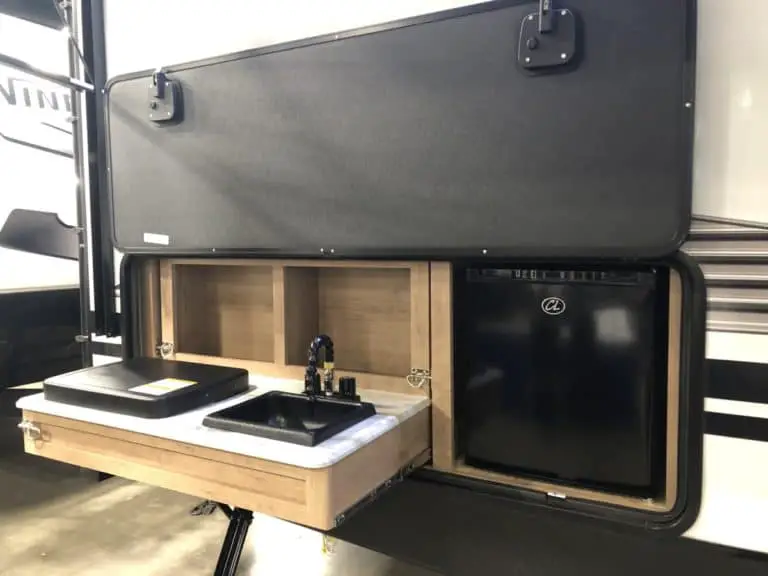Can I Ride in a Travel Trailer or Fifth Wheel While it is Being Towed?
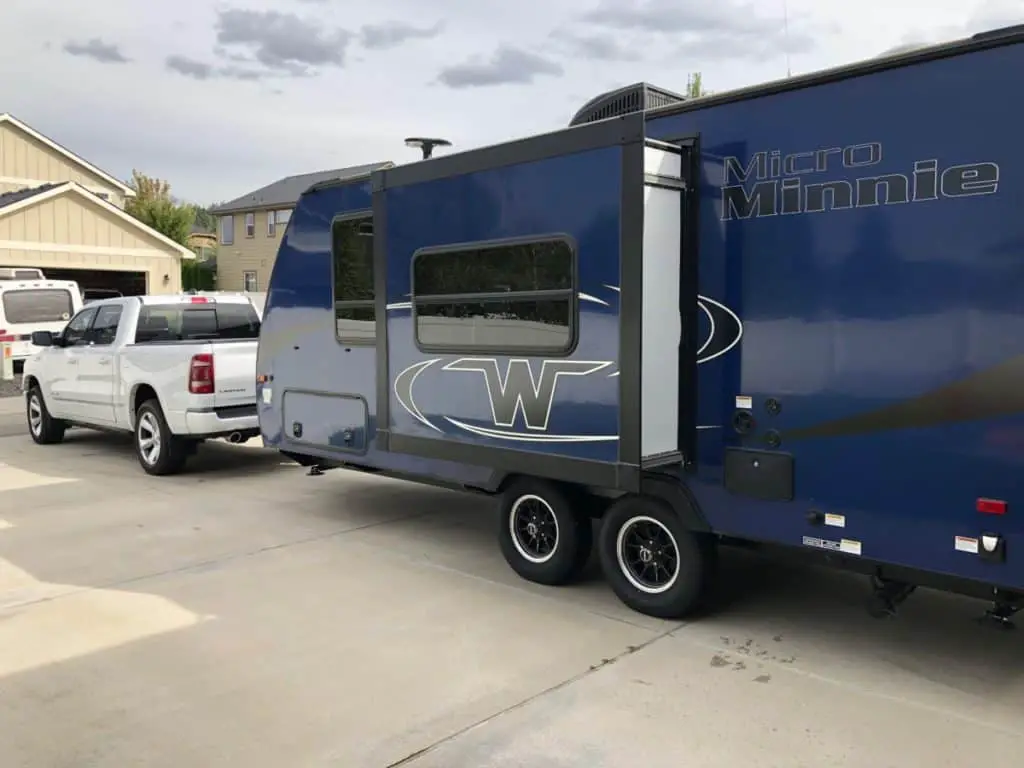
How many times have you driven down the road and noticed a cozy looking travel trailer or fifth wheel cruising by? I know I have thought about how nice it would be to ride in the comfort of a travel trailer instead of in the passenger seat, especially after a particularly long trip when your legs are cramping and you just can’t seem to find a comfortable position.
Can you ride in a travel trailer or fifth wheel while it is being towed? In some states, it is legal to ride in a 5th wheel or travel trailer. Some states deem it safe, while others will slap you with a hefty fine if you do it. Either way, there are other dangers to consider if you choose to ride in one while traveling the road.
Continue reading to find out why you can and cannot ride in a travel trailer or fifth wheel while it is being towed. While the comfort factor may be tempting, there are considerations that need to be made regarding the safety of this decision. Please note, this article is not referencing motor homes, this is only discussing recreational vehicles that are being towed.
Riding in a Travel Trailer or Fifth Wheel That is Being Towed
When you look at travel trailers and fifth wheels that are being towed down the road, you know they are not a small piece of equipment. They are often extremely large and built to be lived in and moved around the country. You may also question why people are sitting in a cramped car or truck when they could be riding in luxury just a towing hitch away.
The thought of lounging on a couch while traveling for many miles is extremely appealing, or how about sitting at a table to eat while you are traveling, instead of awkwardly trying to eat everything, get a drink and not make a mess in the process. Although appealing there are reasons this luxury may not be safe.
Safety
There are many reasons why riding in the back of a travel trailer or 5th wheel is truly not safe. These reasons are:
- Interior Stability
- Passenger Supervision
- Safety
- Unpredictable Driving
If you have ever driven a vehicle while towing a trailer, boat, or an RV, you know how difficult the trip can be. Driving into a cut with windy conditions can send your vehicle rocking back and forth, the amount of time it takes to break is increased and the difficulty of your drive increases exponentially. You must remember you are only in control of your tow vehicle, the object that is being towed is not able to be controlled aside from being attached to the vehicle with a hitch.
Interior Stability: Typically, when you drive a car, you feel a certain sense of stability. You can easily control the speed and direction of the car with limited stress. When you add the extra weight of an RV that is being towed behind the car, the amount of control you have becomes a bit limited. Turning can become more cumbersome and stopping time and distance is a real safety factor. Trailers can also have sway problems that could knock people around without knowing what is coming up.
Passenger Supervision: Most individuals that have travel trailers and fifth wheels travel with a family that typically includes children. While it may be appealing to let your little people have the freedom of sitting in the travel trailer and out of the car, you could be putting them in danger. Remember the vehicle they are in is being towed. The only way you can access them is to stop the vehicle and get out to see them. If you cannot trust your kids to the fullest to do the right thing, this could be extremely dangerous. They can also get hurt and you would have no means of communication to stop the vehicle.
Safety: When you are riding in a passenger vehicle there are specific built in protections to keep you safe. Most vehicles have seatbelts, airbags and other features that are manufactured to keep passengers safe. When you look at travel trailers and fifth wheels, they are not manufactured to keep passengers safe, they are made to be used when not being moved. Therefore, if you are riding in one of these items, there will likely not be seatbelts or any other safety features to help you in the event of an accident.
Have you ever seen a travel trailer that has been in a wreck? They basically are torn to shreds because they have no crunch zone such as a car, or they do not have structural portions to hold together. If you were to get into an accident, I would expect the trailer to basically fall apart and the passengers to have no safety within.
Unpredictable Driving: Just like the weather, travel trailers and fifth wheels can be highly unpredictable when being towed. The slightest bump in the road or wind gust can send your whole vehicle lurching around the road, which can cause an extreme safety hazard if you are not careful. Imagine walking around and not knowing the driver will be applying the brakes. You will go flying.
Many campers do not have a forward facing window so you really will have no idea what is coming up next, a curve, turn, stop, acceleration, swerve, etc…
As you can see, there are several factors that need to be considered related to safety before you decide to ride in a travel trailer or fifth wheel that is being towed.
States that Allow it
In some situations, the decision to ride in a travel trailer or fifth wheel that is being towed will be completely at the discretion of the driver. Many states deem it safe for passengers to ride in a camper that is being towed. You need to research the laws carefully, however, because they can be amended and changed frequently. The laws also differ between travel trailers and fifth wheels.
Travel Trailers: The states that currently allow passengers in travel trailers are Arizona, Indiana, Iowa, Kansas, Maryland, Michigan, Minnesota, Missouri, Nebraska, and North Carolina.
Fifth Wheels: The states that currently allow passengers in fifth wheels are Arizona, California, Colorado, Indiana, Iowa, Kansas, Maryland, Michigan, Minnesota, Missouri, Montana, Nebraska, New Jersey, North Carolina, North Dakota, Oregon, Pennsylvania, South Dakota, West Virginia, and Wisconsin.
Because there are often restrictions on what this looks like in and between states, you need to thoroughly know the law and be prepared to ask questions prior to traveling if you need to confirm the details. There are many resources online that may be helpful to you, but remember not all websites are kept up to date so if you have a question about the laws that are currently in place it would be wise to contact the state DMV for specifics. You can also look at the Triple A site under the heading Digest of Motor Laws for more specifics to help you out.
Also keep in mind how the laws will impact your decisions as you cross state lines.
If you have passengers riding in the travel trailer or fifth wheel in a state that is legal but cross into a state where it is illegal, you need to adjust prior to crossing the state line.
What Happens if I Break the Law?
This question may seem like a bit of a no brainer, but I know there are people asking this question as to contemplate pushing the limits just a bit to make a long trip more bearable. If you decide to push the limits there are a few things that could happen.
- You get a ticket and fine
- Injury or death
I know the list is not extensive regarding what could happen if you push the envelope with avoiding the law, but I think the latter is enough motivation to abide by the laws.
Ticket and/or Fine: This is the most likely thing that will happen if you get caught allowing passengers to ride in a travel trailer or fifth wheel illegally. Again, this is going to vary for each state as far as cost, and whether you receive points on your license.
It is also important to remember tickets and points on your license will often result in a necessary court appearance and increased insurance costs. If you are traveling across states, this appearance may be difficult for you to make. It is also important to remember breaking a law like this will likely not be easily argued as allowable in court. If you receive points on your license you may also be required to attend traffic school to remove them.
The thought of a hefty fine, court appearance and potential of traffic school (which I hear is brutal), should be enough to convince you to follow the law when driving.
Injury or Death: Yep, I am not going to sugar coat this one because it is a truth that needs to be stated. If you decide to allow passengers to legally or illegally ride in a travel trailer or fifth wheel you could be putting their lives in danger. Remember how unpredictable objects being towed are. If you have unsecured passengers along with belongings in the travel trailer, you are putting them at risk unnecessarily.
The least that could happen is an injury to someone if things begin shuffling around the trailer or if you happen to have a minor accident. However, if you are traveling down the interstate and have an accident the results will likely be much more devastating and will likely result in loss of life. Maybe you can get over the fact that you had a hand in someone losing their life, but it surely seems like a gamble that is not quite worth taking.
As you can see there aren’t a lot of things that can happen if you decided to break the law, however the ultimate outcome could be quite dismal and force you to live with something that is extremely hard to get over for many years to come, if ever.
RV Accidents
You are likely thinking this article has taken quite a dismal turn and you are correct, but they are things you need to know when deciding if you allow people to ride in a travel trailer or fifth wheel that you are pulling. Again, there are states that find it completely safe to do this, but many do not. Even if you are in a state that allows this behavior, you need to take the safety factors into consideration to make a choice that is best for your family.
John Marcus shares statistical information in his article The RV Industry Has Rebounded in a Big and Beautiful Way. Detailing the number of RV’s on the road is close to 9 million. With this increase in use, comes the increase in the number of accidents each year. While an RV seems like a solid piece of equipment, and it likely is, there are factors that cause accidents that are out of the driver’s control.
- Weather
- Other Drivers
- Road Conditions
Weather: No matter how much we would like to, the weather is completely out of our control and can change rapidly. If there is a situation where wind starts gusting and rain is pouring down, your ability to control the vehicle is significantly impacted, which means an accident is more likely to occur. If you have passengers in the travel trailer or fifth wheel, their safety is at a much higher risk as well.
Other Drivers: No matter what vehicle you are driving, you are ultimately at the mercy of other drivers on the road. When driving, you will face distracted drivers, speeding drivers, impaired drivers, and tired drivers. Each of these situations increases the risk of you having an accident while towing an RV. Again, these are things that you cannot control, but it is to your advantage to plan for them to be a possibility. A quick stop because of a distracted driver could have serious implications to the passengers that are not secured in the vehicle being towed.
Road Conditions: When we think of road conditions, we typically think of weather-related conditions such as snow or ice. It is important to remember road conditions can also relate to the condition of the road being driven on. If you are driving on a road that is full of potholes or is under construction, there is a higher likelihood of you having limited control of your vehicle. These things can also cause your vehicle to be tossed from side to side on the road. Again, this could present a dangerous situation for any unsecured passengers.
There are many things that are out of the driver’s control, but there are also several factors that are well within the drivers control such as.
- Speed
- Weight load
- Uneven Load
Speed: Speed is a huge factor in the safety of any driver and is well within the control of the individual driver. You must remember the added weight of a travel trailer or fifth wheel is going to increase the amount of time you need to stop, therefore short stopping distance and fast stops are not going to be possible. In fact, there are specific towing speeds for each state that have been written into law. Hint: none of these are over 65 MPH. For a comprehensive list of theses speeds, check out the article, Complete Guide of State Towing Speed and Laws You May Not Know, written by Christina Nellemann
If you are uncertain about the appropriate speed at which you should travel, common sense should prevail. If you are driving and feel like you do not have full control of your vehicle, there is a chance that you are going to fast and need to slow down.
Weight Load: When you are traveling for any length of time, packing is a necessity. Given the extra space that a travel trailer or fifth wheel provides it may be tempting to pack as much as you can. I am going to caution you with doing this. If you over pack the travel trailer or fifth wheel you are adding a significant amount of weight to an already heavy load. When you add more weight, you begin to limit the control you have over the vehicle as well as the stopping distance required.
Uneven Load: When packing the RV, you must be calculated with your method. If you place all your items in one spot of the travel trailer you are likely going to have an unbalanced load. While this may not seem like a big deal, it can cause the travel trailer and fifth wheel to travel unevenly down the road, increasing your chances of sway as well as stopping distance and making control much more difficult and dangerous.
Looking at all these accident risks, I want you to think about having family members riding in the travel trailer or fifth wheel in the event of any of these things happening. As you can see it can put them at a significant risk.
Final Thoughts
Some states allow passengers to ride in travel trailers and fifth wheels that are being towed, however you need to use your own common sense to determine if this is the best decision for your family. While it may be a safe situation as far as the driver is concerned, there are many factors outside of your control that need to be factored in as you make the decision to allow passengers to ride in a travel trailer or fifth wheel.
Be the first to be notified about FREE tips, hints, coupon codes, and email-exclusive information. All for FREE!

